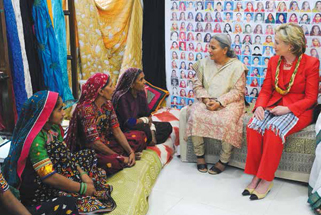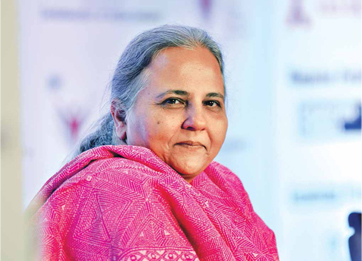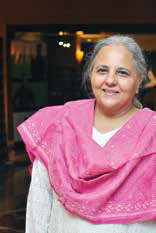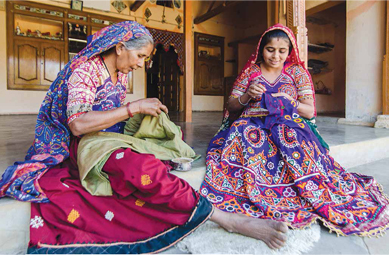The Confederation of Indian Industry (CII), over the past few decades, has been working towards inclusion and empowerment of women, both at workplace and at the grassroots. To accomplish this goal, CII created an exclusive platform for women called ‘Indian Women Network (IWN)’ a one-of-a-kind women’s forum providing a platform to women themselves. Through IWN, they hope to provide a support mechanism for women and girl students with focus on Learning and Development, Well-being, and Policy and Advocacy. In an exclusive interview, Corporate Citizen speaks to Reema Nanavaty, Padma Shri awardee, and General Secretary, Self Employed Women’s Association (SEWA), at the CII-IWN Summit, held recently in Mumbai
"Today, a skilled embroiderer can earn up to Rs.10,000 per month. Earlier these women were earning only Rs.75. They now have assets like land, savings, insurance. Their children attend schools and migration has stopped

Two million women are a part of informal women sectors, both from the rural and urban areas of India, says Reema Nanavaty. She proudly states that “SEWA organises these women who are either homebased workers or working as artisans, garment stitching, rolling bidis or agarbattis or making kites, vendors and hawkers, women who earn a living by selling fruits or vegetables or other food items on the streets. Our fight is against poverty—how to bring dignity and self-respect to these women and their families. At SEWA, the belief is that poverty is also a form of violence with the consent of the society which snatches away their dignity, the choice and voice of these women”.
We at SEWA also come together as women, no matter what caste or community, religion or country we belong to. That’s how we have built a movement of women of co-operatives and labour movement as well. Our goals are full employment and self-reliance of our members. Full employment brings women the income security. When a woman is economically secure, she’s able to fight with her very many social issues. She’s able to pull herself and her family out of hunger and starvation and bring in economic self-reliance at her household and at the enterprise level.
While I was visiting villages in North Gujrat in a very dry dessert area of the land in the 1980s, I saw every household had a woman who could embroider. This was also true when I was visiting the villages in UP, in Assam or in West Bengal, yet they were all working as casual workers digging earth or on building sites. They earned only Rs.75 a month. Here was a skill which had the potential to turn into a lucrative livelihood and then I meet a born leader and a fearless pioneer in Purvi or in Rabiya Jaan or in Mausami.
I told them that they could find women willing to embroider for a fair pay or bring them work and pay cash. Women did not believe what I said because that was the traditional skill, which they had not even dreamt of turning into a livelihood opportunity.

Purviben and four other women took up this job of embroidering kurtas and in the very first week earned Rs.150 and then earned Rs.500 a month, for the first time sitting at home. Sure enough the word got around and next time more women joined in. Purviben started organising more and more women with embroidery and other craft skills in several villages, districts and in several States too. In two years’ time , she had organised more than 15,000 women artisans.
The women’s embroidery enterprise is now a major source of income and livelihood in these areas. Almost all the 15,000 women are artisans but I’m sorry to say all are illiterate. Today, a skilled embroiderer can earn up to Rs.10,000 per month. Whereas, earlier these women were earning only Rs.75. The families now have assets, land, livelihood, water pumps, tractors, house savings, insurance and their children attend schools. Migration from the families has stopped.
Women’s employment has brought about a change in the family dynamics as well as in the community. Today Purviben sits proudly on the board of her company SEWA Trade Facilitation Centre with a turnover of over Rs.50 crore. By enhancing and building on the skills that these women already have, they now express confidence in their own abilities. They are able to gain strength from camaraderie of other women. So, the coming together on the basis of work allows women to set in motion transformation of themselves and of their community. As a result of the increasing income, the immediate effect can be seen on the health of the community and the children’s education.

Reema Nanavaty was born in Ahmedabad, Gujarat, on 22nd May 1964, and graduated in Science from the Gujarat University. Opting for a career of civil service, she passed the civil services examination (IAS). However, her stay there lasted only one year as she quit the service to take up full-time social service. Nanavaty, upon resigning from the Indian Administrative Service, joined in 1986, the Self Employed Women’s Association of India (SEWA), an NGO founded by Ela Bhatt, a Gandhian and a social worker. She became the General Secretary of the organisation in 1999 and embarked on a series of public service activities, concentrating on the village poor and extending the reach of SEWA to more districts in Gujarat. It was under her leadership, SEWA started self-help groups and a retail distribution network, Rudi, to take the goods produced by SEWA sisters to 40,000 households. In 2001, Nanavaty launched Jeevika project, in association with the Government of Gujarat and International Fund for Agricultural Development (IFAD), an initiative to bring relief to the 2001 Gujarat earthquake victims and their families. A year later, she started Shanta, a relief programme to aid the 2002 Gujarat riots victims. She has taken SEWA out of Gujarat and the activities of the organisation, now, spans across the country from Jammu & Kashmir to Assam. They are also involved in war-torn Afghanistan, Bhutan and Sri Lanka. Her current assignment is to nurture SEWA Trade Facilitation Centre (FTC), a wing which attends to the development of artisans in the villages. In 2013, the Government of India honoured Reema Nanavaty with the fourth highest civilian award, Padma Shri.
Yes , I would also like to share with you, 21-year-old Rubina Akhtar’s experience. A young Muslim girl from Kashmir who lost her father in the political turmoil,wanted to study, but she had to drop out of school to help her mother in the household chores. The family ate just one meal a day. This was just five years ago. Worries about her future plagued her day and night. Then an opportunity came her way.
Rubina joined a group of 25 women under SEWA in Gujarat for a month-long training in repairing solar lights. Villages around her hometown of Kupwara barely have electricity and the women collect firewood for cooking and heating. Rubina was keen to introduce solar lights to relieve women like her mother from the drudgery of collecting firewood.
Talking and listening to the life struggles of other women and how they overcome made her realise indeed she was strong and that she could make a major difference. Rubina then returned to Kupwara and organised a Self Help Group (SHG) of young women like her to assemble solar lights. Of course, the men in the village weren’t happy that a young girl like her dared to start an enterprise and challenged her ‘if you’re really good then repair this light’. He pointed to the solar light in the mosque which had been non-operational for two years. Rubina humbly accepted this challenge, quietly set to work and in a flash the light in the mosque started working. The Maulwi himself was impressed and he came to honour her. His approval opened the doors for other girls like Rubina in Jammu & Kashmir.

I would like to share an experience of Amina Beg Jaan from Afghanistan. She lived with her family of nine members having lost her father when she was only a year-old and her mother getting remarried. Taliban killed her step-father, her two brothers and a sister. Amina Jaan was injured in a blast and was bedridden for four years. She also had her fingers and her legs permanently damaged. She had lost all hope in life and being physically challenged, was seen as a liability by her brothers since nobody would be interested in marrying her with an old mother and a handicapped sister. Therefore, Amina Jaan was compelled to marry a widower in the neighborhood with six children. As luck would have it, the husband had a stroke in six month’s time. So, now Amina Jaan had to look after the six children and nurse a paralytic husband. She can barely remember when she had a proper meal. Fortunately, she came in contact with the ministry of women’s affairs and learnt about the ongoing vocational training programmes. She immediately applied for one and when she got to attend the training, she felt as if life’s happiness has come back. Today, Amina Jaan runs the vocational training centre in Baghla where in two years more than 500 women have been trained by her. Why I am sharing these examples is because SEWA is all about peoples’ partnership. We are only the facilitators. Today, the women have their own bank called SEWA bank with its own capital of Rs.300 crore. We have our own SEWA’s management schools with design management courses in partnership with IIM and IRMA. We have our own insurance cooperative which we call it as VimoSEWA. We have an energy access initiative ‘Hariyali’ with its brand RUDI.
"I urge you to recognise the work of these women groups as central to the social responsibility, if it has to be inclusive and sustainable. They are workers, producers and entrepreneurs in their own right...
I would just like to say, based on our four decades of experience, there’s immense energy and creativity in the informal economy workers which contributes to the national economic growth. But these efforts are not recognised and do not get enough support. Surely I would request friends from the formal sector, the corporate world to come forward to support and expand these economic efforts as partners for change.
As our founder Elaben Bhatt says “In my experience, women are rebuilding a community focusing on women. You’ll find an ally who wants a stable community and wants roots for her family. In return, you get a worker, a provider, a caretaker, an educator, and a networker. A forger of bonds, essentially, you have a creator and a preserver. We consider women’s participation and their representation an integral part of our peace process. Women will bring constructive, creative and sustainable solutions to the nation”.
I urge you to recognise the work of these women groups as central to the social responsibility, if it has to be inclusive and sustainable. They are workers and producers and entrepreneurs in their own right and they take financial risks every day of their lives. They work extremely hard to earn their living. What they need is work that brings them a decent income. It is our responsibility to ensure productive work in the hands of all and enhance the dignity of work in our country. If we fail. we will be left with hunger and violence. This is what we call at SEWA - to enable and equip the poor to fight against the poverty, earn a life of dignity and self-respect that our members at SEWA call the economic freedom or the doosri azaadi”.
By Vandana Patnaik